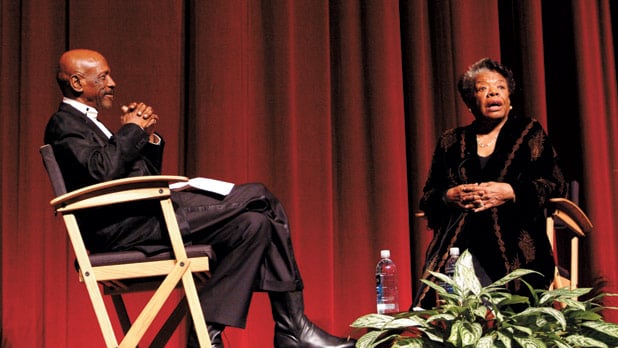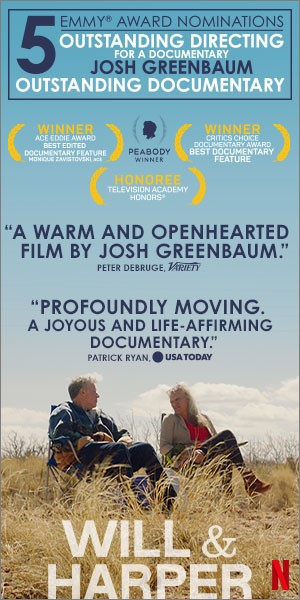"...Now you understand just why my head's not bowed. I don't shout or jump about or have to talk real loud. When you see me passing, it ought to make you proud... 'Cause I'm a woman. Phenomenally. Phenomenal woman. That's me."
The words above, from Dr. Maya Angelou's landmark poem "Phenomenal Woman," were first published in 1978 as an empowering message to women. But on Thursday, May 13, the DGA's African-American Steering Committee and a host of friends and fans showered Guild member Angelou with their own uplifting words during the moving program, "A Tribute to Dr. Maya Angelou: Master Storyteller."
Angelou, a director, actress, playwright, civil rights activist and author of five volumes of autobiography and numerous books of poetry, first gained widespread critical acclaim for her 1970 autobiography I Know Why the Caged Bird Sings. In the 1970s and '80s, she took her stories from the stage to television by writing teleplays for Georgia, Georgia (1972), I Know Why the Caged Bird Sings (1979) and Sister, Sister (1982). She also directed the short film All Day Long, the musical And Still I Rise, and wrote and produced several prize-winning documentaries, including Afro Americans in the Arts, a PBS special which earned her the Golden Eagle Award.
She had segued into film by penning a song with Quincy Jones for the 1968 feature For the Love of Ivy and in 1993 supplied the poetry written by the character played by Janet Jackson in John Singleton's Poetic Justice. In 1998, at the tender age of 70, Dr. Angelou made her feature directorial debut with Down in the Delta.
"It's very rare to find an individual like Dr. Maya Angelou," director/producer and AASC Co-chair Loretha Jones said during the tribute's opening remarks. "One of the hardest things that we do as directors is to find ways to translate the written word into a visual image that's going to have an emotional impact on our audience. We have all heard about the power of a picture to speak a thousand words. What we've gotten through Dr. Angelou is the power of a single word to affect us with a thousand emotions."
Guest speakers, casting director Rueben Cannon, actress Diahann Carroll, writer/director/actress Kasi Lemmons, director John Singleton, director and AASC member LeVar Burton and actress Alfre Woodard, offered their own comments about the influence of the master storyteller. What became evident was that Angelou had personally touched each of their lives and careers. Cannon was hired to cast her teleplay, Sister, Sister. Burton co-starred with her in Roots. Carroll starred in Angelou's I Know Why the Caged Bird Sings and Sister, Sister. And Woodard co-starred with Angelou in How to Make an American Quilt and was directed by her in Down in the Delta.
"There are all kinds of directors," Woodard said, humorously addressing the directors in the audience. "Most of you have the gift of a cinematic eye that leads our focus onto a vast landscape or onto a moment in time that has caught a revelation about the human condition or human nature. Then there's that rare director who is able to look from God's eye view and depict rigorously who and where we are, and also translate ideas that open us up to possibilities of our better selves. Dr. Maya Angelou is that rare filmmaker."
For the last half of the program, Oscar-winning actor and DGA director member Louis Gossett, Jr. highlighted the rarity of Dr. Angelou's gift of directing during a candid conversation with her. Layered with pearls of wisdom, priceless bits of advice and inspiring stories of overcoming personal and professional obstacles, Dr. Angelou offered the audience a glimpse into her rising career as an artist and filmmaker.
"The idea of overcoming is always fascinating to me. It's fascinating because few of us realize how much energy we have expended just to be here today," said Angelou in response to why she chose Down in the Delta as her feature directorial debut. "I don't think we give ourselves enough credit for the overcoming. In that film, because one person overcomes, she influences the overcoming of the family."
Angelou continued to explain that like other directors, her principles were tested when she was presented with a decision to alter her original vision of her film. She responded to the studio pressure by digging in her heels and holding her ground.
"I agreed a long time ago, I would not live at any cost. If I am moved or forced away from what I think is the right thing, I will not do it," she said. "Yes, you must be agile and willing ... but if one is being asked to contradict ... You must remember there is different in manner, but not different in meaning."
A Renaissance woman with many influences, Angelou served as the northern coordinator for the Southern Christian Leadership Conference at the request of Dr. Martin Luther King. She was also appointed by President Gerald Ford to the Bicentennial Commission and by President Jimmy Carter to the National Commission on the Observance of International Women's Year. And as one of President Bill Clinton's favorite poets, she presented the poem, "On the Pulse of the Morning," which she wrote especially for his inauguration as the 42nd President of the United States in 1993.
Those historical experiences enhanced Angelou's life as a filmmaker, and she said she also found inspiration from the works of director John Ford, Andrew Lloyd Webber and writers James Baldwin and Lorraine Hansberry.
"I enjoy some of the film directors in this country," she said. "They did some important work, because of their rhythm. It's like watching the tapping of Bojangles and Fred Astaire. I think that John Ford and a number of those sorts of directors really respected the rhythm of the human voice."
And as long as she has a voice, Angelou said, she will continue to tell stories that keep her "feet on the ground."
Written by Monice Mitchell Simms





